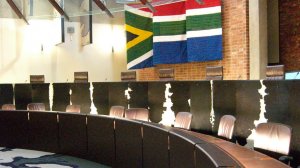- Democratic Alliance v African National Congress and Another (CCT 76/14) [2015] ZACC 10.59 MB
Today the Constitutional Court handed down judgment in an application for leave to appeal against a judgment of the Electoral Court. The dispute involved an SMS which the Democratic Alliance (DA) sent to more than 1.5 million voters in Gauteng during the run-up to the 2014 general elections. The SMS read “The Nkandla report shows how Zuma stole your money to build his R246m home. Vote DA on 7 May to beat corruption. Together for change”, and was sent one day after the Public Protector released a report concerning her investigation into security upgrades at President Zuma’s private residence (Nkandla Report).
The African National Congress (ANC) brought an application in the South Gauteng High Court, Johannesburg (High Court) for an interdict against the DA and an order compelling it to retract the SMS and to apologise. Its contention was that the SMS constituted false information, published with the intention of influencing the outcome of the election in violation of section 89(2) of the Electoral Act and item 9(1) of the Electoral Code of Conduct (Code). Relying on its right to freedom of expression, the DA opposed the application, arguing that the SMS was fair comment and expressed a genuinely and honestly held view based on the facts contained in the Nkandla Report. It also contended that the content of the SMS was not false. The High Court held that the message amounted to fair comment and therefore found in favour of the DA and dismissed the ANC’s application. The ANC appealed to the Electoral Court, which reversed the High Court’s decision. It held that the SMS was false, and that its publication thus constituted a violation of the Electoral Act and Code.
The Constitutional Court unanimously granted the DA leave to appeal, but produced three separate judgments. In the main judgment, Zondo J (Jafta J and Leeuw AJ concurring) found that the SMS constituted a statement of fact which was false and, accordingly, was in violation of the Electoral Act and Code. He found that an ordinary, reasonable reader of the SMS would have understood it to mean that the Nkandla Report explicitly concluded that President Zuma stole taxpayers’ money to build his R246 million home – which the Nkandla Report did not do. To understand the SMS otherwise would require the reader to review the Nkandla Report in its entirety, which such a reader would not normally do. Accordingly, he would have dismissed the appeal.
A joint judgment written by Cameron J, Froneman J and Khampepe J (Moseneke DCJ and Nkabinde J concurring) highlighted the interconnectivity between the right to freedom of expression and the right to vote, as well as the long-standing rule that penal provisions must be interpreted restrictively. It also observed that comments and opinions may be criticised for being unfair or unreasonable, but rarely for being “false”. Therefore, and because section 89(2)(c) of the Electoral Act and item 9(1)(b) of the Electoral Code refer to “false information” and “false allegations”, respectively, the provisions apply only to factual statements and not comments or opinions. This judgment found the SMS to be an expression of a comment or opinion, as it was an interpretation of the Nkandla Report. The SMS was not intended to be, and did not hold itself out as being, authoritative. Therefore the judgment concluded that the SMS fell entirely outside of the ambit of section 89(2)(c) and item 9(1)(b) and it was unnecessary to rule on whether the SMS was false. As a result, it upheld the DA’s appeal and ordered that the judgment of the Electoral Court be set aside.
In a separate judgment, Van der Westhuizen J (Madlanga J concurring) agreed with this outcome and order, but for substantially different reasons. He agreed that the Electoral Act and Code must be interpreted narrowly and in light of the rights to freedom of expression and to free and fair elections. However, he disagreed with the finding that an opinion cannot be “false information” and therefore disagreed with the conclusion that the Electoral Act and Code only prohibit false statements of a factual nature. He thus declined to determine whether the SMS was strictly fact or opinion, finding that the statements fall somewhere on a spectrum between the two. A statement’s veracity must be evaluated more generously the closer it is on the spectrum to an opinion and more strictly the closer it gets to a pure statement of fact. The SMS has components which suggest it is factual, but could also be interpreted as a comment. He therefore interpreted the word “stole” generously and held that the conduct of the President, as described in the Nkandla Report, could fit into one of the possible meanings of the word. Accordingly, this judgment found that the SMS was not “false information” and as such, its publication was not prohibited by the Electoral Act or Code.
In the result, the appeal was upheld and the order of the Electoral Court was set aside with no order as to costs, as per the joint judgment.
This explanatory note is provided to assist the media in reporting this case and is not binding on the Constitutional Court or any member of the Court.
EMAIL THIS ARTICLE SAVE THIS ARTICLE
To subscribe email subscriptions@creamermedia.co.za or click here
To advertise email advertising@creamermedia.co.za or click here








![Democratic Alliance v African National Congress and Another (CCT 76/14) [2015] ZACC 1](https://cisp.cachefly.net/assets/articles/images/resized/0000386426_resized_constitutionalcourtofsa1022.jpg)


